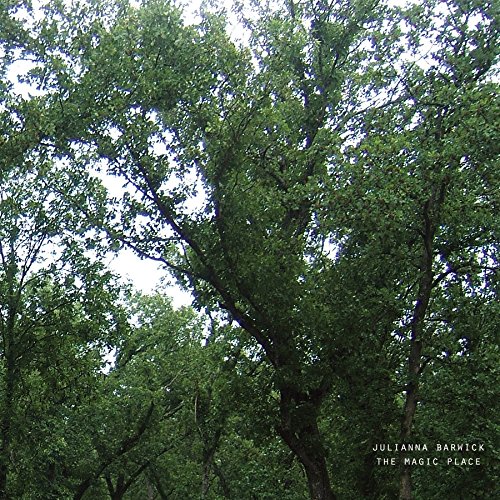
Julianna Barwick
The Magic Place
Release Date: Feb 22, 2011
Genre(s): Pop/Rock, Alternative/Indie Rock, Alternative Pop/Rock
Record label: Asthmatic Kitty
Music Critic Score
How the Music Critic Score works
Buy The Magic Place from Amazon
Album Review: The Magic Place by Julianna Barwick
Great, Based on 9 Critics
Based on rating 8.5/10
The interface between the voice and technology is central to Juliana Barwick's art. A Louisiana-born, Brooklyn-based singer who previously released the album Sanguine and the EP Florine, Barwick makes music whose raw material is almost exclusively her voice. But it's hard to know what she might sound like alone in a room. When she records, Barwick layers and processes and twists her utterances into figures that can alternately be described as familiar, soothing, alien, and tense.
Based on rating 8/10
Everyone may have a voice, but not too many know how to use it to full effect like Julianna Barwick does. Getting across deep emotion and meaning without ever uttering a single word, Barwick finds the sweet spot between the sensual and the sacred in a way that’s never weighed down by New Age-y baggage on her album, The Magic Place. Making something grand out of the tiniest and most subtle of nuances, Barwick creates soundscapes that feel intimate, yet seem almost cosmically vast at the same time.
Based on rating 8/10
In The Magic Place, Julianna Barwick creates dense and luminous sonic architecture with just two main tools – her voice and a loop station. It's beautiful; something that shouldn't come as a surprise to anyone familiar with her previous releases, 2009's Florine and 2007's Sanguine. As with those albums, Barwick's looped, stacked choirboy vocals make The Magic Place lullaby-warm.
Based on rating 8/10
If we think about it long enough, images begin to conjure our most heartfelt memories. Whether it’s a childhood anecdote, a lovely night out, or an achievement worth remembering, the things and places that matter are always there to remind you of the past; that sweet, beautiful past. For Louisiana-bred Julianna Barwick, it was a protuberant tree, the kind you always read about in fairy tale books but never really get to stumble upon.
Based on rating 4.0/5
Review Summary: why I love "White Flag" The Magic Place does little to take back Julianna Barwick’s sound as it was on Sanguine and Florine- it’s still very much a story told by her voice- but here it sounds closer to us and in a way, more serious. It’s easy to see a criticism of The Magic Place will be that it seems out of Barwick’s control most of the time, or that she lets her choral work drone beyond its end, but really, it's the first of her records to lay down markers. That’s to do no disrespect to the beauty of Sanguine, a record that reflected the strengths in her (reverb-drenched) a’capella, but a record as endless as that became less about giving her ideas space and more about using all of them- “Scary Cat,” a freak out worthy of Animal Collective, came out of no where and took away what was so powerful about hearing this voice.
Based on rating 8/10
On her third, highest-profile release to date -- her first truly "full-length" outing after an album and an EP which both clocked in under 25 minutes -- sound sculptor Julianna Barwick continues to explore and subtly refine the techniques that made her earlier work so utterly singular and transcendent. Barwick's methods are simple and seemingly straightforward: her music consists of her vocals -- looped and layered, layered and looped, to a sometimes dizzying degree, and swaddled in cavernous, mist-making reverb -- and generally little else. So it can be difficult to account for the immensely captivating, evocative potency of the results.
Based on rating 3.5/5
As a child, Julianna Barwick sang in church choirs in Louisiana and Missouri. When recollecting those a capella hymns of her childhood, it is not the words or the melodies that she remembers, but the different voices’ textures and massed shapes filling a very physical space. She says, “you could really hear all the layers, harmonies, rounds, the men and the women, the claps… everything.” Now a Brooklyn composer, Barwick has previously self-released the Sanguine LP and Florine EP, two well-received releases of elaborate one-woman choral compositions built up out of her own looped voice, layered into wordless, room-filling multitudes.
Based on rating 3.0/5
The first time I heard Brooklyn ambient vocalist Julianna Barwick was during Radiohead’s “Reckoner” Internet remix experiment, in which fans could rework the moody In Rainbows track and post the results online, all so they could be subjected to a rather pointless voting free-for-all. Lost in the shuffle was a particularly haunting rendition in which, in what was to become a Barwick trademark, everything but the barest of instrumental sound was stripped away in favor of cavernous, slowly building vocal harmonies; Barwick had essentially turned “Reckoner” into a naked, poignant a cappella duet with Thom Yorke. That minimalist method has been expanded on her first major-label release, The Magic Place, in which trickling piano, scarce percussion, and loop upon loop of lush, choir-like chanting are thrown together into a graceful, voice-driven miasma.
Opinion: Excellent
An isolating experience, cutting the outside world off entirely. Mike Diver 2011. An opener so often says so much about the record that’s yet to unfold. Straight Outta Compton: bang, get it. Holidays in the Sun: a steel toecap to the teeth. Julianna Barwick’s second album begins with a song ….
'The Magic Place'
is available now

